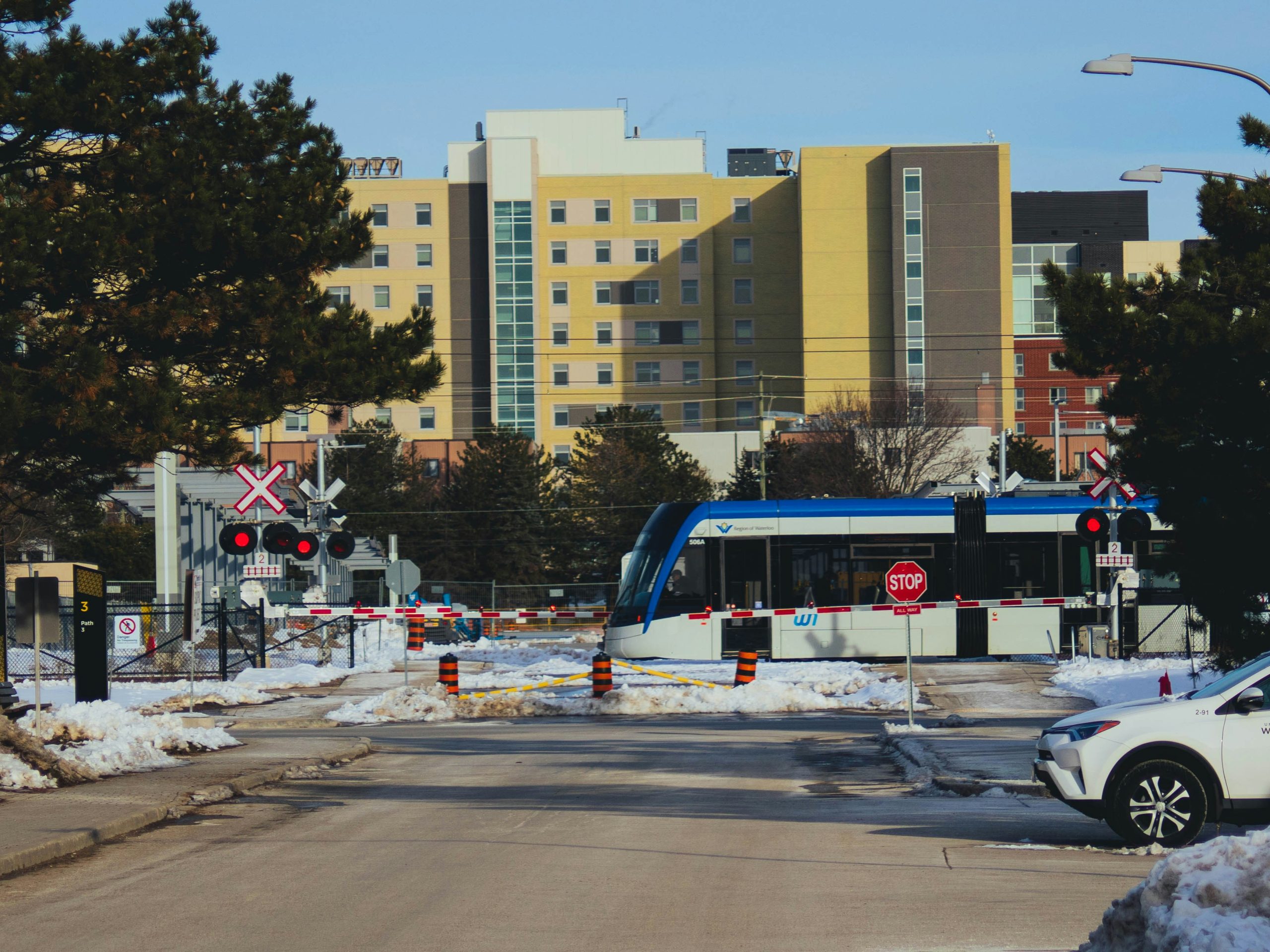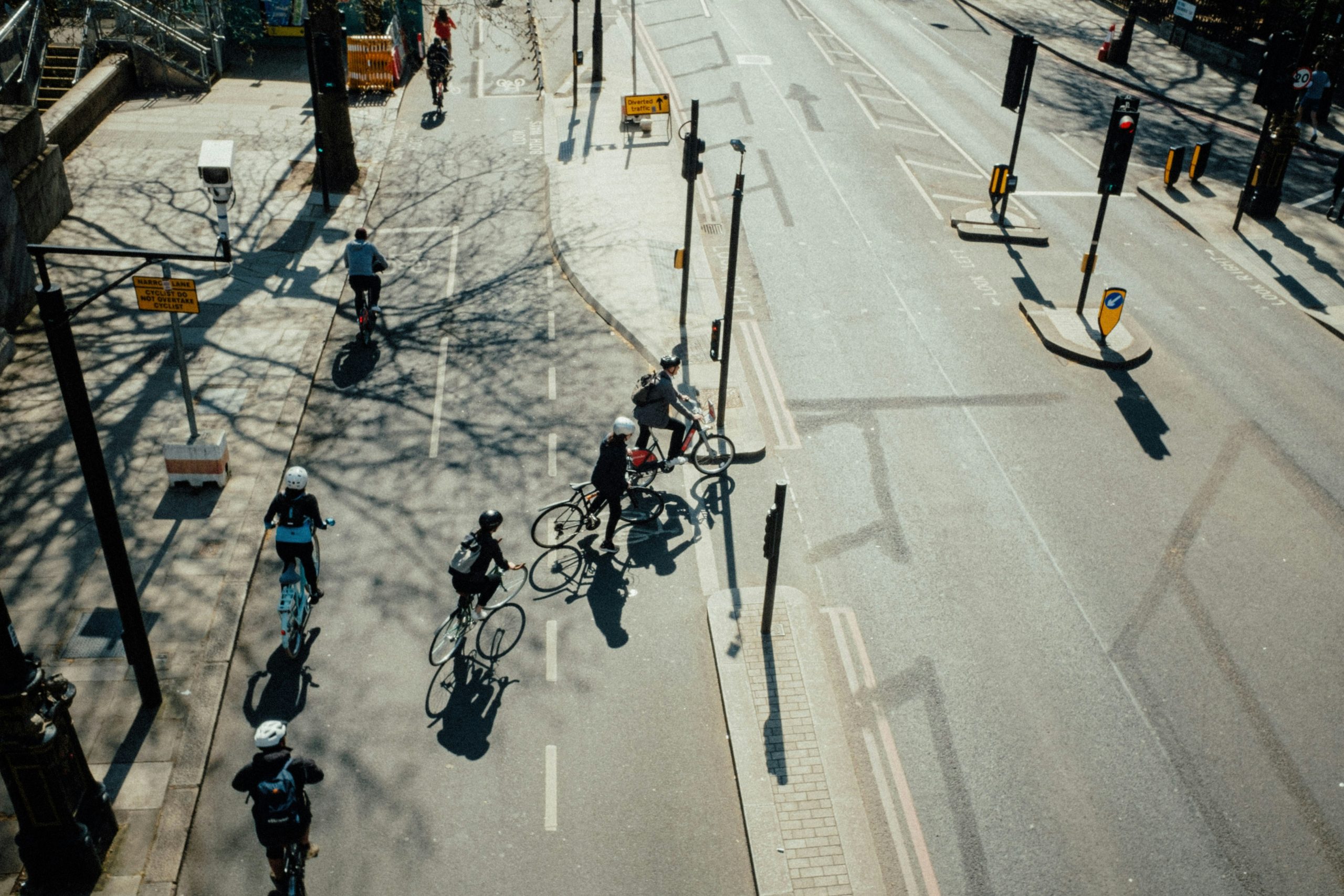Featured Guests
You’ll find this guest among our growing roll of Urban Champions.
-
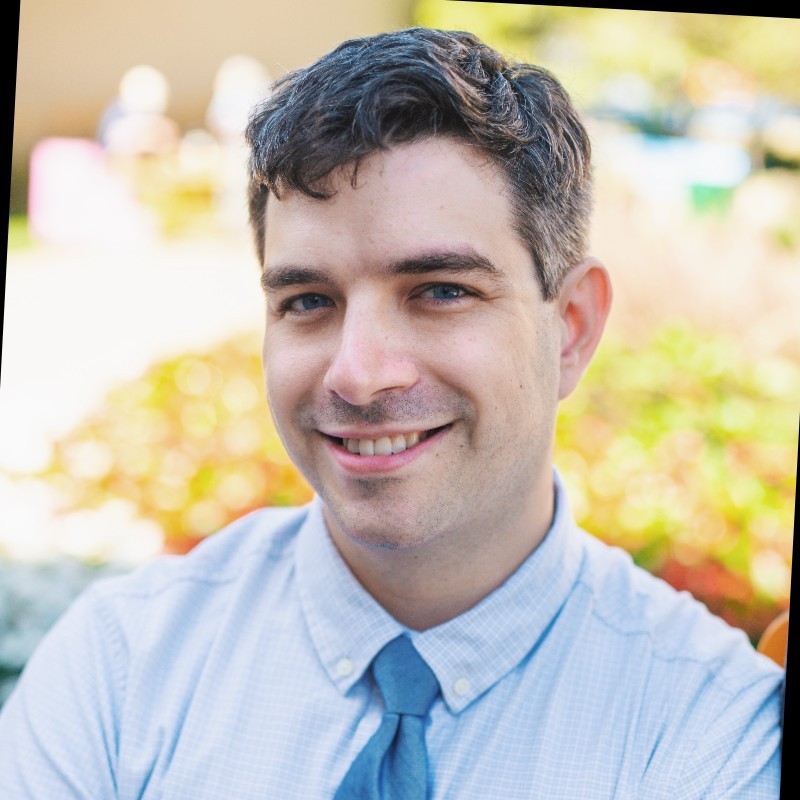
Tosh Chambers
Senior Program Director, MovePGH, Pittsburgh, PA
-
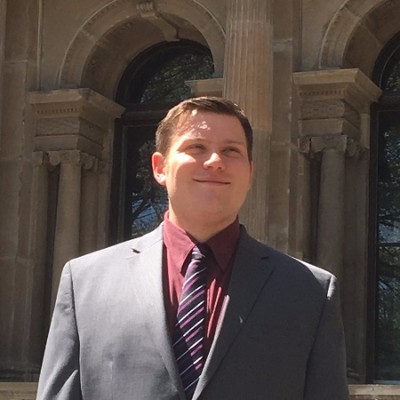
Matthew Palm
Assistant Professor, Department of City and Regional Planning, UNC Chapel Hill
-
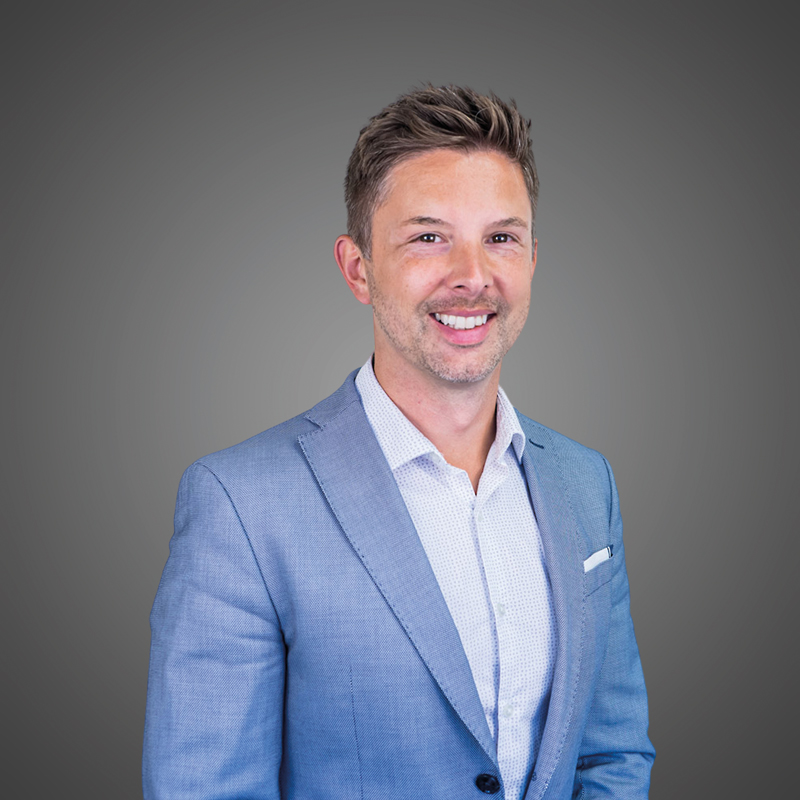
Justin Trevan
VP, AECOM Canada
-
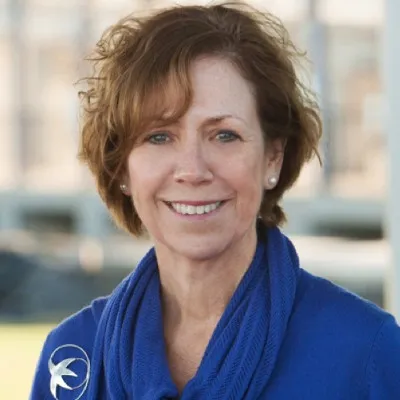
Deborah Wathen Finn
President, The Wathen Group, Morristown NJ
5 Key Takeaways
A roundup of the most compelling ideas, themes and quotes from this candid conversation
1. Furthering the conversation around Mobility as a Service.
In an environment of shifting traveler behaviours, constrained municipal budgets, and unmet mobility needs in equity-deserving communities, the delivery of transit services requires a rethink beyond just serving peak hour commutes. Mobility as a Service (MaaS) is an integrated platform for transportation services that combines multiple modes, public and private, on one easy-to-use navigation and payment app. Research and engagement by a joint CUI-AECOM team found that a MaaS approach can foster greater mobility access by filling service gaps in an urban region for everyone, everywhere, all the time.
See our joint CUI-AECOM report “Mobility as a Service: A Feasibility Study on Implementing MaaS in the Greater Toronto Area,” which explores the desirability of MaaS in the region and sets out a framework to further the conversation around implementation.
2. A whole-of-system approach.
Deborah Wathen Finn, president of US-based The Wathen Group, frames MaaS as an opportunity to link separate mobility systems and incorporate feedback from the business community and customers through collaboration and good governance. A MaaS approach “starts to be realistic” about mobility patterns in urban, suburban, and rural areas and tries to link them “so that we get the most efficiency out of those systems,” enhancing the experience for customers. On the question of leadership, Deborah says the public sector must set the standard around the quality of transit systems to form the basis of agreement between all actors.
Tosh Chambers, Senior Program Director for Pittsburgh’s MovePGH MaaS program, states the need for an organizer to connect different services and providers. “It could be a non-profit, like we’ve managed here, to get all those agencies to speak together, because I think they all recognize that they have their own niche in the transportation ecosystem and they all benefit by working together…”
3. Democratizing mobility: access for all
For MaaS to truly improve mobility access, it must be designed intentionally with an equity-centered process. According to Matthew Palm, Assistant Professor in the Department of City and Regional Planning at UNC Chapel Hill and partner lead for Mobilizing Justice’s pilots program, “[MaaS] can be a way to actually target resources towards equity-deserving communities to remove financial barriers to access certain services.” Service areas in Pittsburgh, targeted from an equity standpoint, saw riders starting their trips in these areas receive a 25 percent discount. There’s an opportunity for MaaS to reach everyone, but that’s contingent on “real partnerships with community groups that are on the ground in different neighbourhoods…”
Tosh, speaks to MovePGH’s approach, “I don’t think you need to look at [MaaS] as this massive program requiring a ton of funding.” With a low budget and effective tactics, such as creating mobility hubs, strategic deployment, and pushing for equity pricing, the MovePGH team successfully coordinated partners to implement MaaS in Pittsburgh.
4. Reducing car dependency by providing affordable alternatives.
Travel behaviour is inextricably linked to urban environments and the availability of mobility options. Matthew sees MaaS as a way of reaching “folks who live in outer suburban communities who aren’t necessarily driving by choice.” “I think there’s hope for [MaaS] to try and reach those folks by helping make things more affordable as a means of getting alternative modes into some of those communities.” A MaaS platform also provides real time and reliable information on available options and service interruptions allowing travelers to plan their commutes according to need and preference, gaining efficiencies in cost and time.
Deborah calls on attendees to imagine how we could run a mobility system, for example, on days where there isn’t enough capacity on the highway. “We’ll give you a discount if you get on the transit system.” Excitedly, she calls this the real frontier in managing big urban areas.
5. Iterative prototyping to evaluate and adapt.
Justin Trevan, AECOM Canada’s Vice President and Growth Strategy Lead, calls for the need to experiment. “It wasn’t until you could actually get to the pilot stage and try it, would you discover the things that did or didn’t work. …I think process is actually the most critical piece … because the piece that you discover at the end of it might not be the thing you thought you were going to solve.” The process for evaluation needs to be set up in a way that allows for iterative prototyping.
Building on Justin’s point, Deborah has seen successes for agencies rolling out high-tech solutions. When OMNY was introduced in New York City as a contactless payment, it began as a pilot with employees and some of the contractors. This was followed up by placing ambassadors on specific transit lines as the offering was expanded.
Full Panel
Transcript
Note to readers: This video session was transcribed using auto-transcribing software. Questions or concerns with the transcription can be directed to events@canurb.org with “transcription” in the subject line.
Full Audience
Chatroom Transcript
Note to reader: Chat comments have been edited for ease of readability. The text has not been edited for spelling or grammar. For questions or concerns, please contact events@canurb.org with “Chat Comments” in the subject line
00:42:19 Emilie Charlebois (CUI): Welcome everyone! We invite you to say hello in the chat before we get started. Tell us where you’re watching from!
00:42:30 Emilie Charlebois (CUI): Please change your chat settings to “Everyone” so that everyone can read your comments.
00:43:05 Isabelle Poirier: Good afternoon,
00:43:14 Isabelle Poirier: Isabelle Poirier from Toronto
00:43:33 Mark Hafen: Mark Hafen, Toronto
00:43:42 David Zurawel: Hello Everyone, looking forward to an interesting presentation and discussion.
00:43:49 seyedmohsen Alavi: Hi, My name is Mohsen from Toronto. My research focuses on Shared mobility, travel behaviour and equity.
00:43:58 Andrew Robertson: I am Andrew, also watching from Toronto 🙂
00:44:07 Carolyn Whitzman: Carolyn Whitzman from the unceded territory of the Anishnawbe Algonquin people, colonially known as Ottawa.
00:44:13 David Zurawel: David Zurawel, in Toronto
00:44:13 Leah Thomas: Hello from Leah Thomas in Argyle of London, Ontario
00:44:14 Don McConnell: Don McConnell, Sault Ste. Marie
00:44:18 Liz Hoffman: Liz from Saskatoon, SK
00:44:21 Emilie Charlebois (CUI): Amplify the conversation on social media! @canurb #citytalk
00:44:24 Luisa Trevisan: Hello from Calgary!
00:44:42 Emilie Charlebois (CUI): We are recording today’s session and will share it online at canurb.org/citytalk-canada/
00:44:44 Emilie Charlebois (CUI): We have closed captioning enabled for today’s session. If you would like to turn it off, please click on the button at the bottom of your screen and disable
00:44:51 Emilie Charlebois (CUI): We hope this session is as interactive as possible, so please feel free to share comments, references, links or questions in the chat.
00:44:55 Ivana Spasovska: Ivana Spasovska, Toronto
00:45:04 Lauren Patterson: Lauren Patterson from Halton!
00:45:21 Heather McGeer: Hello! Heather from Toronto, ON
00:45:32 Alison Stewart: Alison Stewart from Cycle Toronto. Urbanists unite indeed! 🙂
00:45:40 Shilpa Dogra: Shilpa Dogra, Ontario Tech University in Oshawa
00:45:43 Cameron MacLeod: I’ll use #citytalk on Mastodon (I’m @c_9 and @CodeRedTO on mstdn.ca), looks like CUI is only on Elon’s awful site and not Mastodon yet.
00:46:05 Kaiden Gartry: Kaiden from TransLink in Vancouver
00:46:08 Morgan Vespa: Hello! Morgan from Winnipeg which is in Treaty 1 Territory and the National homeland of the Red River Metis
00:46:11 Nada Djokic: Hello everyone! I’m Nada Djokic from Edmonton. I lead our Vehicle for Hire Program.
00:46:30 George Claydon: George from Infrastructure Canada in Ottawa- Hello everyone!
00:46:44 Joe Loreto: Hi all! Joe Loreto, Architect from Toronto
00:46:54 Alannah Webb: Alannah from Edmonton, permit coordination
00:47:06 Stephan Dery: Hello! Stéphan from Toronto.
00:47:09 Mauritz Kruger: Mauritz from the East of Toronto
00:47:20 Niklas Kviselius: Niklas, TransLink, Metro Vancouver
00:47:25 Luis Patricio: Hi everyone. Luis Patricio, Pillar Nonprofit (sdgcities.ca) and Huron University from London Ontario.
00:47:52 Emilie Charlebois (CUI): Leandro Santos – Research Planner, Applied Solutions, Canadian Urban Institute (Toronto, ON)
00:47:55 Emilie Charlebois (CUI): Leandro is a Research Planner at CUI Applied Solutions. At the Canadian Urban Institute, he has worked on a series of city-building projects addressing post-COVID urban recovery, housing, and community engagement processes. He has conducted research informing federal housing programs, highlighted best practices in Windsor, Victoria, and Halifax for Canadian city builders, and strives to meaningfully elevate the voices of communities marginalized by colonial systems, institutions, and urban planning processes. Leandro holds a Bachelor of Urban and Regional Planning from Toronto Metropolitan University and a Bachelor of Arts in Political Science with a concentration in International Relations from Carleton University. He firmly believes that for cities to prosper, they must be created by everybody, for everybody.
00:48:09 David Scrivener (CUI): Here’s a link to the Mobility as a Service report from CUI and AECOM: https://aecom.com/gta-maas-study/
00:48:45 Patricia Taylor: Hi, Pat Taylor from York Region Social Planning Council
00:48:48 Anne Marie Aikins: HI everyone…it’s Anne Marie Aikins in Toronto. I always learn a lot from these events so thank you to organizers and speakers
00:50:37 Graham Beck: Hello – Graham Beck, Regional Development, City of Edmonton
00:51:53 Emilie Charlebois (CUI):Please note that given the limited duration of these sessions, we are not able to answer to raised hands. Do you have specific questions for the panellists? Post them in the chat, and we’ll try to answer as many as possible.
00:52:04 Krista Gladney: Hi! Krista Gladney, Healthy City Development Coordinator with the City of St. John’s
00:52:07 Emilie Charlebois (CUI): Responses to questions and additional resources will be provided in the chat by CUI staff.
00:53:19 David Scrivener (CUI): In case you missed it from earlier, here’s a link to the Mobility as a Service report from CUI and AECOM: https://aecom.com/gta-maas-study/
00:53:59 Emilie Charlebois (CUI): Justin Trevan – Vice President, Cities Growth Strategy at AECOM (Toronto, ON) Justin is a Vice President and Growth Strategy lead for AECOM in Canada where he is focused on the development and use of new innovative services, thought leadership and strategic relationship management to embed a growth culture within AECOM. An industry leader in digital consulting and advisory services, Justin has worked at the intersection of technology and the built environment for over 20 years. He has worked on all sides of the technology fence, ran a start-up, been accepted to a US-based tech accelerator, and has advised organizations and boards on digital transformation. He intimately knows all sides of the innovation agenda for various market segments and client types.
AECOM
@AECOM
00:54:16 Mark Hafen: Lost him
00:54:16 David Zurawel: Bandwidth a problem…
00:56:35 Richard Gould: You mention equity. What about working conditions and economic security for drivers working for companies such as Uber, etc.?
00:57:04 Emilie Charlebois (CUI): Deborah Wathen Finn – President, The Wathen Group (Morristown, NJ)
00:57:27 Emilie Charlebois (CUI): Deborah Wathen Finn has 35 years of experience in the transportation industry. She has held executive level positions with major private sector infrastructure firms, leadership positions in public transportation authorities, and operational oversight for commuter rail, light rail, bus, and paratransit operations. She has conducted due diligence and peer reviews for various agencies with a special focus on operational effectiveness and system and operating safety.
00:57:29 Emilie Charlebois (CUI): As President of The Wathen Group, Ms. Wathen Finn provides strategic consulting assistance to clients on strategic planning, crisis management, and negotiations, as well as transit and rail operational issues. Having served as part of APTA’s trade mission to Asia to observe models in Japan, Hong Kong, and Singapore she is additionally familiar with other models for improving mobility in various metro areas. Ms. Wathen Finn serves on various advisory boards and is active in community and trade organizations.
Home
00:58:03 Emilie Charlebois (CUI): Welcome new joiners! Just a reminder to please change your chat settings to “Everyone” so we can all see your comments.
00:58:59 Emilie Charlebois (CUI): Tosh Chambers – Senior Program Director, Move PGH (Pittsburgh, PA)
00:58:59 Kirsten Watson: Hi everyone, Kirsten Watson from AECOM joining from Toronto.
00:58:59 Leandro Santos (he/him): Richard, while I would’ve loved to explore workers rights in the gig economy, it was outside of the scope of our research. But definitely a great question, and a major concern!
00:59:00 Emilie Charlebois (CUI): As the Senior Program Director of Move PGH, Tosh Chambers worked to coordinate a consortium of transportation service providers to produce a Mobility as a Service offering in the City of Pittsburgh. In his previous role with Pittsburgh’s Department of Mobility and Infrastructure (DOMI), Tosh drafted formational policy related to the regulation of shared mobility services including scooter, moped, and car share. Many of his efforts were dedicated to planning for integrations between mobility applications, and the placement and creation of multi-modal “mobility hubs” throughout Pittsburgh. Prior to his time with DOMI, Tosh worked in mapping and analysis of Autonomous Vehicles, Public Transit, and curbside infrastructure.
https://move-pgh.com/
@WeMovePGH
00:59:17 Mark Hafen: Native of Pittsburgh here, now in Toronto!
00:59:25 Glenn Asano: Glenn Asano, Leaside Business Park Association, Toronto
01:00:03 Emilie Charlebois (CUI): The CityTalk chat is as lively as ever. Amplify the conversation on social media! @canurb #citytalk
01:00:07 Dan Hoornweg: Hello everyone. Here’s a back-up report from ON Tech highlighting that a shift to MaaS in Ontario would save households $8000 and reduce CO2 emissions by 25Mn tonnes per year. https://sites.ontariotechu.ca/sustainabilitytoday/blog-posts/blog-posts/2018/11/driving-made-in-ontario-solution-to-congestion-climate-change-and-economic-prosperity.php
01:00:54 Emilie Charlebois (CUI): Please note we are recording today’s session and will share it online within a week at canurb.org/citytalk-canada/
01:00:58 Leandro Santos (he/him): Thanks for the link, Dan!
01:01:34 Michael Nyormishie: I am an Assistant Development Planning Officer in Ghana and have special interest in this subject area. How can I get involve so we talk the African perspective as well? I can be contacted via email: mrmichaelny@yahoo.com
01:01:57 Cheryl Braan: Cheryl Braan from the Region of Waterloo. (Finance)
01:03:16 Kimberley Nelson: How do systems meld social enterprise ventures with private for-profit scooter / bike share and city run transportation? How do those relationships form?
01:04:00 Emilie Charlebois (CUI): Matthew Palm – Research Coordinator, Mobilizing Justice Project (Toronto, ON) Matthew Palm is a researcher affiliated with the Mobilizing Justice Partnership based at the University of Toronto Scarborough. The goal of the partnership is to advance transportation equity through innovative research and knowledge mobilization. Dr. Palm is also an incoming Assistant Professor of City and Regional Planning at the University of North Carolina, Chapel Hill. For Mobilizing Justice, his research focuses on evaluating the equity impacts of new transportation technologies and innovative policies.
Home
01:04:11 Mark Hafen: Democratization of options requires democratization of infrastructure to support them.
01:04:23 Richard Gould: Be happy to use my bicycle more to get to destinations. But I want to be sure that my bike is safe and still there when I want to head home. What is being done to better protect bikes when parked?
01:04:24 Matthew Palm (he/him): I run the innovative pilots program at Mobilizing Justice. We partner with cities and regions who are piloting new services, technologies, or infrastructure and conduct before/after studies of equity impacts. Check us out and email me (palmmatt@unc.edu) if your region has a project you’d like to nominate! More info: https://mobilizingjustice.ca/working-groups/technologie-de-mobilite-et-pilote-de-politique-innovante/
01:04:36 Emilie Charlebois (CUI): The CityTalk chat is as lively as ever. Amplify the conversation on social media! @canurb #citytalk
01:05:27 Michael Nyormishie: City mobility issues in Ghana can include traffic congestion, inadequate public transportation systems, lack of proper pedestrian infrastructure, and limited cycling facilities. These challenges often lead to longer commute times, increased air pollution, and overall difficulty in moving around urban areas. Efforts to improve city mobility might involve investing in better public transportation, promoting non-motorized modes of transport, and implementing effective traffic management strategies.
01:07:09 Leandro Santos (he/him): We found that in order for micro-mobility modes and active transportation to be viable alternatives to personal automobile ownership, there really needs to be the physical infrastructure in place to support those modes so people feel safe to adopt them.
01:09:16 Luis Patricio: Absolutely Leandro. Safe, convenient and reliable!
01:10:25 Michael Nyormishie: Collaboration between the West and Ghana to address mobility issues can involve various approaches: Knowledge Sharing: The West can share their experiences and best practices in urban planning, transportation infrastructure, and sustainable mobility solutions. This could include workshops, seminars, and technical exchanges to help Ghana learn from successful projects and strategies.
01:11:01 Cameron MacLeod: Shifting the prioritization from moving cars to moving people. We need to shift that base assumption.
01:11:40 Mark Hafen: @Cameron Absolutely.
01:11:47 Anne Marie Aikins: Most agencies thought they could make things more convenient (which they do) by digitizing everything related to transit and then with smaller government support for operating dollars they also figured they could save money by removing the staff. They soon figured out they needed to bring the frontline staff back especially as people return to transit after a long time away.
01:12:01 Emilie Charlebois (CUI): Friendly reminder to attendees to please change your chat settings to “Everyone” so all can see your comments.
01:12:10 Leandro Santos (he/him): Michael, I love the idea of sharing practices.
01:13:44 Michael Nyormishie: Leandro how can I get direct chat with you. I want us to get connected. I work with local government service and want collaboration with your team
01:13:59 Alannah Webb: Better to spend a small $ on a pilot that might or might not work, than have a large $ failure
01:14:16 Leandro Santos (he/him): Michael, you can reach me at lsantos@canurb.org
01:15:27 Cameron MacLeod: A comment from a follower on Mastodon in response to my posts there: “Please bring up the serious need of physically disabled people to be actively included in accessibility consultations before any new infrastructure is designed/changed. It saves everyone time/money/stress. We’re often consulted for remedial help, after the fact.”
01:15:31 Kimberley Nelson: @Alannah Also makes it easier to walk away if not working, instead of doubling down on bad decisions based on prior investment
01:16:48 Stephen Marano: In the GTA, transportation planning is highly political. There is much bickering amongst the politicians, which leads to delays and frustration.
01:17:09 Stephen Marano: Canadian politicians love to pass the buck regarding funding and responsibility.
01:17:15 Mark Hafen: 👍
01:17:26 Cameron MacLeod: @Stephen: absolutely agreed.
01:17:41 Leandro Santos (he/him): Cameron, thanks for bringing up the need to engage folks with disabilities. I find that in any policy or program consideration, engagement with diverse communities really needs to happen at the beginning of the process, with regular check-ins throughout, for real opportunities to co-design and meaningfully integrate feedback into decision making.
01:17:52 Alannah Webb: Pilots can also be a great way to test accessibility of new systems while paralleling the existing system, it doesn’t feel like the rug is being pulled out from under those with less accessibility
01:18:14 Kimberley Nelson: Intact was willing to offer reduced rates if you drove less than 10,000K a year I think
01:19:05 Kimberley Nelson: And I haven’t owned a car in 10 years so would have been some time ago they were doing that
01:19:07 Luis Patricio: Leadership in government really makes a difference. Many politicians will be open to those ideas but afraid this would jeopardize their political careers. Initiatives that can help shift the public perception of people oriented mobility technologies and policies is crucial.
01:19:14 dorian moore: Key question: How (and) can we synchronize and integrate mass transit with micro-mobility? And, if so, what kind of entity controls the coordination?
01:19:44 Stephen Marano: I can think of the King Street Pilot project in Toronto. It was, and is a success. The only issue is that the police do not enforce the rules as much as they should regarding the cars.
01:20:12 Leandro Santos – CUI (he/him): Read CUI and AECOM’s joint report, which includes a case study on what Tosh is talking about, re: MovePGH: https://aecom.com/gta-maas-study/
01:20:17 seyedmohsen Alavi: Info: At York University, we conducted a comprehensive research study examining shared mobility and post-secondary students’ travel behavior within the Greater Toronto and Hamilton Area (GTHA). Our findings reveal that since the onset of COVID-19, shared mobility has notably risen in popularity among these students
01:20:26 Andrew Robertson: King St in Toronto suffers from a lack of permanent installation
01:20:31 Cameron MacLeod: @Stephen: key point! It was a huge success per dollar and is being left to rot.
01:20:55 Andrew Robertson: The temporary infrastructure is still not being replaced despite it being the third-busiest route in the city (including subways!)
01:21:06 Kimberley Nelson: To the equity piece, most of the areas lacking in public transit are also missing in active modes infrastructure…. it is much larger ask to build all in underserved communities, but they desperately need it
01:21:15 Luis Patricio: I know in Brazil, some insurance companies are the ones who sponsor bikeshare programs
01:22:04 Emilie Charlebois (CUI): As always, the The CityTalk chat is thoughtful, provocative and dynamic! Amplify the conversation on social media! @canurb #citytalk
01:22:11 George Claydon: Or moving from 2 cars to 1 car
01:22:43 Leandro Santos – CUI (he/him): When I was visiting Amsterdam, I noticed many families with young kids biking around the inner city. Was really eye opening considering the North American narrative of families requiring a car for daily tasks.
01:22:49 Kimberley Nelson: Hitting the kids early to expose them to alternative modes is key https://www.youthenroute.ca/infrastructure-reports-for-a-safer-calgary/
01:23:01 Torshie Sai: Great point Matthew about the equity of accessing these alternative modes, and the options they do have available to them (e.g., older vehicles that might impact their own personal health, and the health of the environment.)
01:23:12 Luis Patricio: Good point Mary. And we know from research that important life transitions are good opportunities to change how they get around: moving to a new city, starting a job, getting married, starting school…
01:23:20 Stephen Marano: @Cameron I worked near King Street and saw numerous cars driving through the intersection when they should have turned right. The cops are not there to enforce it. I will concede that there should be a more permanent installation.
01:25:14 Matthew Palm (he/him): Transit App is a wonderful resource. They are helping communities do public engagement more too.
01:26:23 Kimberley Nelson: Incorporating bike share / scooters into the monthly bus pass would be a game changer – it becomes expensive to do multi-modal trip-chaining when you are paying each leg separately based on availability
01:27:33 Richard Gould: Automated cameras at the intersections on King. If you go straight through you get a ticket and fine (hopefully large).
01:28:58 Leandro Santos – CUI (he/him): Kimberly, subscription models that offer blends of mode options have been implemented in MaaS systems we looked at overseas.
01:29:22 Stephen Marano: @Richard That could work. Some advocates would despise this, but community safety is important too.
01:30:12 Kimberley Nelson: @Leandro Very cool! Any you remember that I can look into?
01:30:52 Leandro Santos – CUI (he/him): Without going into my notes, top of mind, Whim in Helsinki.
01:30:53 Cameron MacLeod: Never accept a framing that puts transportation as a service connected to profit, though.
01:31:23 Alannah Webb: Municipalities would never have gone for a risky venture like scooter rental, and were skeptical, but as a private enterprise, they’ve had great success in Edmonton. But muni’s can borrow massive capital costs for infrastructure/fleets, that private can’t necessarily. We have to work together
01:31:31 Cameron MacLeod: Transit is the region’s blood system which powers the economy and academia and night life etc. It is not a profit centre.
01:31:38 Mark Hafen: The TTC’s solution to reduced ridership and revenue was to cut service. That’s not the way to do it, and it amplifies inequity.
01:31:46 Cameron MacLeod: @Mark exactly right
01:32:13 Cameron MacLeod: Private companies can adapt for sure – Communauto for example has greatly benefited from being adaptable to users’ needs.
01:32:14 Stephen Marano: The media is partly to blame for the fear of public transit. You hear stories about people getting assaulted all the time.
01:32:15 Judith Norris: As a non-driver public transit user, I am frustrated by constant TTC delays making my late for work and appointments, as well as just trying to get home. I find I use GO transit more to avoid the TTC delays. That is part of the problem to me.
01:32:55 Cameron MacLeod: @Judith: yes, TTC service reliability has degraded a huge amount. Impacts choice riders too.
01:33:11 Alannah Webb: Every dollar spent on transit is $3 back in the economy as mobility encourages economy. So just looking at ridership/fees doesn’t show the whole “profitability” picture of transit
01:33:43 Mark Hafen: @alannah Exactly
01:33:49 Kimberley Nelson: Compared to playing non-consensual bumper car lottery that occurs daily on roads, it already is safer
01:33:55 seyedmohsen Alavi: We found shared mobility and Mobility as a Service (MaaS) play a crucial role in aiding people with disabilities and promoting social inclusion
01:33:57 Shilpa Dogra: Lack of reliability of service and poor perceived safety are why people will end up switching to micromobilities… or stick with their cars. Especially true in mid-sized/smalller cities.
01:34:04 Luisa Trevisan: I totally agree of creating fun in commuting. I use the train to get to work, and to access the station I cross a huge parking lot, and to arrive at the office I cross another parking lot. It is sad and horrible doing that everyday. There is no city around, I feel vulnerable and the money spent on public transit are too much in comparison of what it has to offer.
01:35:13 Kimberley Nelson: In Calgary there was a kid that held his birthday party travelling with a pack of kids on the Ctrain, went viral! Super fun
01:36:14 Anne Marie Aikins: For GO Transit, weekend ridership is well beyond pre-pandemic levels mostly related I think to the weekend fare details. Ridership during the week remains low because of WFH. And the same fare deals are not offered
01:38:00 Matthew Palm (he/him): The demand is less mono-culture too
01:38:36 Stephen Marano: Many employers want their employees in the office due to productivity concerns.
01:38:50 Emilie Charlebois (CUI): Keep the conversation going #CityTalk @canurb
01:38:51 Emilie Charlebois (CUI): If you have any questions you would like us to follow up on, please send them to cui@canurb.org
01:38:52 seyedmohsen Alavi: @Matthew, absolutely right. I found that safety concerns have significantly influenced travel behavior and mode choice, especially among non-male participants in the GTHA
01:38:55 Stephen Marano: Also, because they can.
01:39:34 Judith Norris: @ Matthew, The Celestine Prophecy, basically there are no coincidences book.
01:39:51 David Zurawel: Thank you for the interesting discussion, I have to drop off for another meeting.
01:40:10 Emilie Charlebois (CUI): Thank you for joining us! We have recorded today’s session and will share it online along with the chat transcript and key takeaways within a week at canurb.org/citytalk-canada/
01:40:16 Stephen Marano: Thank you for the discussion, everyone.
01:41:01 Luis Patricio: Thanks for the great conversation. CUI always hosts insightful discussions. I learned a lot today.
01:41:12 adriana dossena: Thank you for discussion – humbly recommend latest book(s) by Jeremy Rifkin
01:41:24 Dinesh Burad: Thank you for the insight and discussions.
01:41:35 Emilie Charlebois (CUI): Stay tuned for our September CityTalk on Public Libraries and updates for our State of Canada’s Cities conference on Nov. 30!
01:41:36 Leandro Santos – CUI (he/him): Thank you Matthew, Deborah, Tosh, and Justin!
01:41:38 Caroline Taylor: Great discussion. Some great takeaways. Thanks.
01:41:39 Emilie Charlebois (CUI): https://canurb.org/subscribe/
State of Canada’s Cities
01:41:44 Matthew Palm (he/him): Thank you!
01:41:45 Kirsten Watson: Great discussion today! Thank you!
01:41:45 Leandro Santos – CUI (he/him): And everyone in the chat!
01:41:47 seyedmohsen Alavi: Than you all
01:41:50 Luke Grazier: Thanks everone!
01:41:58 Mark Hafen: Thanks everyone!
01:42:16 Emilie Charlebois (CUI): CUI/AECOM MaaS report: https://aecom.com/content/gta-maas-study/
01:42:16 Joe Loreto: Thanks everyone! Great conversation
01:42:17 Kevin Bailey: This was a really really great session, appreciate all the contributors
01:42:18 Luisa Trevisan: thank you everybody! great talk!
01:42:24 Kaiden Gartry: thank you
01:42:27 Emilie Charlebois (CUI): Thank you Everyone!
01:42:28 Cameron MacLeod: Thanks!

